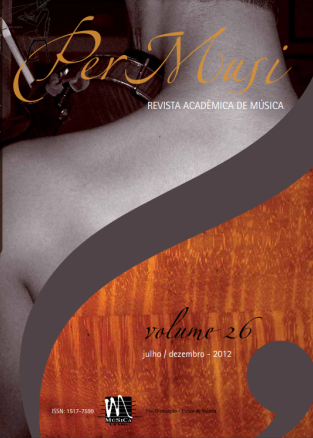Tchaikovsky, leitor de Dante
lugar da angústia e imaginação narrativa em Francesca da Rimini op.32 (1876)
Palavras-chave:
Tchaikovsky, Romantismo na música, Música e literatura, Representação e mímesisResumo
Este texto tem como objetivo discutir a estrutura do poema sinfônico Francesca da Rimini op. 32, composto por Piotr Ilyich Tchaikovsky (1840-1893) em 1876, inspirado no Canto V do Inferno (1307) da Divina Comédia de Dante Alighieri (1265-1321). Interessa-nos observar como Tchaikovsky parte do texto poético de Dante – usando-o como fonte – e desenvolve uma narrativa musical que abre ao ouvinte outros planos do sensível. Em Francesca, Tchaikovsky não se limita ao relato, mas cria, a partir dele, o seu próprio. Procuramos encontrar a operação-chave da estrutura compositiva da obra que parece ser a mímesis: se Dante descreve o que “vê” no real de sua ficção, Tchaikovsky descreve o que sente no “real” do espaço-tempo musical.
Referências
ABBAGNANO, Nicola. Dicionário de Filosofia. São Paulo: Martins Fontes, 2003.
ALIGHIERI, Dante. Inferno: Canto III. Disponível em: http://www.dominiopublico.gov.br/download/texto/gu000997.pdf. 2011a (Acesso em 20 de maio, 2011).
ALIGHIERI, Dante. Vita Nuova. Disponível em: http://www.consciencia.org/dante-alighieri-vida-nova. 2011b (Acesso em 20 de maio, 2011).
AUERBACH, E. Dante, o Poeta do Mundo Secular. Rio de Janeiro: Topbooks, 1997.
BARENBOIM, Daniel. A música desperta o tempo. São Paulo: Martins Fontes, 2009.
BAXANDALL, Michael. Padrões de Intenção. São Paulo: Companhia das Letras, 2006.
BERBEROVA, Nina. Tchaikovsky: Histoire Dune Vie Solitaire.Paris: Egloff, 1948.
BRANDÃO, Carlos A. L. A Formação do Homem Moderno Vista Através da Arquitetura. Belo Horizonte: Editora da UFMG: 1999.
CAMPOS, Augusto de. Invenção. São Paulo: Arx, 2003.
DORÉ, Gustave. Gates of hell. (Ilustração para A Divina Comédia, Canto V de Dante Alighieri). Disponível em: www.focusfeatures.com (Acesso em 12 de maio, 2011).
______. Hell (Ilustração para A Divina Comédia, Canto V de Dante Alighieri). Disponível em: www.en.wikipedia.org (Acesso em 12 de maio, 2011).
ECO, Humberto. História da Beleza. Rio de Janeiro: Record, 2004.
GONÇALVES, Aguinaldo J. Laokoon Revisitado. São Paulo: Edusp, 1994.
HEIDEGGER, M. Ser e Tempo. São Paulo: Vozes, 2006.
LABOISSIÈRE, Marília. Interpretação Musical. São Paulo: Annablume, 2007.
LIMA, Luiz Costa. Mímesis e modernidade: formas das sombras. São Paulo: Paz e Terra, 2003.
_______________. Trilogia do Controle. Rio de Janeiro, Topbooks, 2007.
LUCCHESI, M. A. A Paixão do Infinito. Niterói: Cromos, 1994.
LUKÁCS, G. Teoria do Romance. Lisboa: Presença, 1982.
PASQUINI, E. e QUAGLIO, A. In: La Divina Commedia.Torino: Garzanti, 2005.
POZNANSKY, Alexander. Tchaikovsky: The Quest for the Man Interior.New York: Schirmer, 1991.
TCHAIKOVSKY, Piotr Ilyich. Francesca da Rimini. Disponível em: http://www.wikipedia.org (Acesso em 12 de maio, 2011).
WILEY, John Roland. Piotr Ilyich Tchaikovsky. New Grove Dictionary of Music and Musicians, Londres: Macmillan, 2001.
ZAMPRONHA, E. Notação, representação e composição. São Paulo: Annablume, 2000.
Downloads
Publicado
Edição
Seção
Licença

Este trabalho está licenciado sob uma licença Creative Commons Attribution 4.0 International License.

Exceto onde está indicado, o conteúdo neste site está sob uma Licença Creative Commons - Atribuição 4.0 Internacional.












